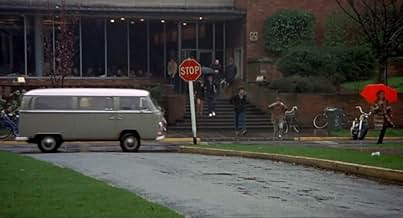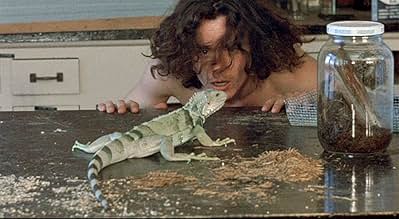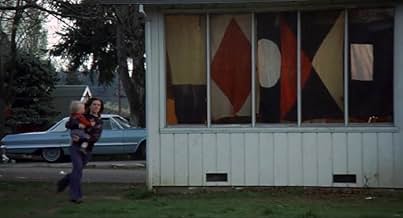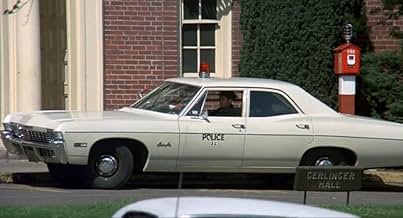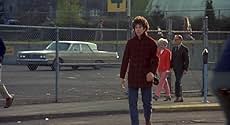CALIFICACIÓN DE IMDb
5.7/10
1.9 k
TU CALIFICACIÓN
La vida de una estrella del baloncesto universitario se complica por un romance prohibido mientras su compañero enloquece evadiendo el servicio militar.La vida de una estrella del baloncesto universitario se complica por un romance prohibido mientras su compañero enloquece evadiendo el servicio militar.La vida de una estrella del baloncesto universitario se complica por un romance prohibido mientras su compañero enloquece evadiendo el servicio militar.
- Dirección
- Guionistas
- Elenco
- Premios
- 1 premio ganado y 1 nominación en total
Michael Warren
- Easly
- (as Mike Warren)
Lynette Bernay
- Dance Instructor
- (as Lynn Bernay)
Joseph Walsh
- Announcer #1
- (as Joey Walsh)
David Ogden Stiers
- Pro Owner
- (as David Stiers)
Mireille Machu
- Secretary
- (as I.J. Jefferson)
Opiniones destacadas
One of the more unusual movies I've ever seen is "Drive, He Said." Made in 1971 made by the same production company that made "Easy Rider" and "Five Easy Pieces" that made Jack Nicholson a star a year or two earlier.
This was the first film directed by Jack Nicholson. It's a combination basketball, free love, anti-draft movie that was filmed on the campus of the University of Oregon. It was not well-received at the time, and was somewhat infamous for its male frontal nudity scenes. The basketball skill level seemed very high.
It's basically the story of two friends--one a basketball star and Greek major who's hormones are raging and is undecided about a pro career. The other is a guy taking drugs to try to stay out of the draft, and basically he flips out.
I thought it was an interesting premise, but I found the speech of the main characters to be stilted. In some ways it captured the ethos of U. S. campuses in the Vietnam War era pretty well.
This was the first film directed by Jack Nicholson. It's a combination basketball, free love, anti-draft movie that was filmed on the campus of the University of Oregon. It was not well-received at the time, and was somewhat infamous for its male frontal nudity scenes. The basketball skill level seemed very high.
It's basically the story of two friends--one a basketball star and Greek major who's hormones are raging and is undecided about a pro career. The other is a guy taking drugs to try to stay out of the draft, and basically he flips out.
I thought it was an interesting premise, but I found the speech of the main characters to be stilted. In some ways it captured the ethos of U. S. campuses in the Vietnam War era pretty well.
One of only three films Jack Nicholson directed. This film was kind of a dud at the time, which probably explains why Nicholson's secondary career never flowered. I have to say, he did have some talent as a director. Unfortunately, Drive, He Said isn't that good of a film. Well directed, but still a bit of a bore. William Tepper plays a college basketball star (in Ohio, as the whole film is meant to make the audience think of Kent State). His roommate, Michael Margotta, is a hippie activist who is about to be drafted. Karen Black, who made a big splash opposite Nicholson in Five Easy Pieces, plays a faculty wife with whom Tepper is having an affair. The big problem with the film is that Tepper is pretty boring and Margotta is extremely annoying. There are some good scenes, but it just doesn't come together. This one is more a candidate for rewatch than A Safe Place (which is on the same Criterion disc), though. I felt like there was something I wasn't getting. I may not have entirely liked it, but it was intriguing.
Poorly developed and fragmented movie about a confused college basketball player with a host of predictably militant and/or cynically unhappy acquaintances characteristic of 1960s academia where the film is set. I'm not sure whether we are supposed to like or even care about the characters or not, but in any event I didn't feel much of either for any of them. Jack Nicholson directed this movie with a taste for profanity and nudity. I guess he thought he was being provocative and progressively mirroring the changing cultural mores of the time. He would have fared better by putting his energy into developing characterization and refining the script that he co-wrote instead. All in all a disappointing movie which left me with a feeling of indifference about it.
Drive, He Said, Jack Nicholson's first solo outing as writer/director for BBS Productions, one of the first true indie film powerhouses, is unfortunately also it's first genuine misfire and failure for good reason: the film is virtually unwatchable.
Nicholson, while unquestionably being one of the greatest actors of our time, never seemed to get much guidance (not one of BBS' strong suits) when writing scripts. He co-wrote Head with Bob Rafelson, mostly stoned, and that actually kind of worked given that film's stream of consciousness/acid-trip feel. At least there was a guiding vision (probably by Rafelson) --- a genuine point to be made. That Nicholson was allowed to botch Jeremy Larner's lauded novel (with help from Larner) is inexcusable. It might have worked better had the actors just been allowed to improv all of their lines...it certainly couldn't have been worse.
Simple elements of the story --- that the college basketball hotshot hero (William Tepper) is boning the wife of a *professor* (not just a random boyfriend) is just glossed over and left for the audience to assume. It makes no real difference, because this story line (like all the others) never goes anywhere. Characters flounder in and out of scenes, overact, underact, mumble their lines, all seemingly at random. It gives you new appreciation for the directors who can pull this type of renegade filmmaking off well (Rafelson, Altman, Cassevetes). You simply cannot stand back and let the actors do whatever they feel like, which is obviously what Nicholson did. He mistakes indie filmmaking with making a documentary film (and even that's a stretch as most docs have a better sense of story and purpose).
Yes, I know the real point is supposed to be the juxtaposition between the go-go rah-rah pointlessness of the basketball story contrasted with the over-the-top campus radical B story starring the unfortunately untalented (and maybe just undirected) Michael Margotta as a guy so intent on dodging the draft that he will incite riots, streak, attempt to assault and rape a woman in her own home, and then loose an entire room of lab animals on each other just to be declared mentally unfit. It's all as subtle as being hit on the head with a sledgehammer and just as artful and entertaining.
If you can endure Karen Black screaming her lungs out for over five minutes straight, you just might have a chance at sitting through this interminably long ninety minute snoozer. If you buy the Criterion BBS box (an awesome set, by the way), it's worth a look because it's such a freak show, otherwise don't bother.
Note that when you read a positive review of this movie though, it is usually slathered with praise about it's nostalgia and social value/accuracy as a "gritty portrait of our times" in regards to early '70s campus friction.
There's a good reason for that too: with a movie as flimsily made as Drive, He Said, you MUST bring something to the equation yourself. God knows it isn't on the film itself.
Nicholson, while unquestionably being one of the greatest actors of our time, never seemed to get much guidance (not one of BBS' strong suits) when writing scripts. He co-wrote Head with Bob Rafelson, mostly stoned, and that actually kind of worked given that film's stream of consciousness/acid-trip feel. At least there was a guiding vision (probably by Rafelson) --- a genuine point to be made. That Nicholson was allowed to botch Jeremy Larner's lauded novel (with help from Larner) is inexcusable. It might have worked better had the actors just been allowed to improv all of their lines...it certainly couldn't have been worse.
Simple elements of the story --- that the college basketball hotshot hero (William Tepper) is boning the wife of a *professor* (not just a random boyfriend) is just glossed over and left for the audience to assume. It makes no real difference, because this story line (like all the others) never goes anywhere. Characters flounder in and out of scenes, overact, underact, mumble their lines, all seemingly at random. It gives you new appreciation for the directors who can pull this type of renegade filmmaking off well (Rafelson, Altman, Cassevetes). You simply cannot stand back and let the actors do whatever they feel like, which is obviously what Nicholson did. He mistakes indie filmmaking with making a documentary film (and even that's a stretch as most docs have a better sense of story and purpose).
Yes, I know the real point is supposed to be the juxtaposition between the go-go rah-rah pointlessness of the basketball story contrasted with the over-the-top campus radical B story starring the unfortunately untalented (and maybe just undirected) Michael Margotta as a guy so intent on dodging the draft that he will incite riots, streak, attempt to assault and rape a woman in her own home, and then loose an entire room of lab animals on each other just to be declared mentally unfit. It's all as subtle as being hit on the head with a sledgehammer and just as artful and entertaining.
If you can endure Karen Black screaming her lungs out for over five minutes straight, you just might have a chance at sitting through this interminably long ninety minute snoozer. If you buy the Criterion BBS box (an awesome set, by the way), it's worth a look because it's such a freak show, otherwise don't bother.
Note that when you read a positive review of this movie though, it is usually slathered with praise about it's nostalgia and social value/accuracy as a "gritty portrait of our times" in regards to early '70s campus friction.
There's a good reason for that too: with a movie as flimsily made as Drive, He Said, you MUST bring something to the equation yourself. God knows it isn't on the film itself.
Hector (William Tepper) is a star basketball player for the College basketball team he plays for, the Leopards. His girlfriend, Olive (Karen Black), does not know whether to stay with him or leave him. And his friend, Gabriel (Michael Margotta), who may have dropped out from school and become a protester, wants desperately not to get drafted for Vietnam.
This film marks Jack Nicholson's directorial debut, a chair he would not return to often. The casting was nothing special (though Karen Black is always great); the best part may be Bruce Dern as the coach. Some day he will get the full respect he deserves.
Roger Ebert found the film "disorganized", but also said it was "occasionally brilliant" with the performances being "the best thing in the movie", including the "laconic charm" of Tepper. This seems fair. For all the good things that can be said, it never really hits home hard enough, and may be dated.
This film marks Jack Nicholson's directorial debut, a chair he would not return to often. The casting was nothing special (though Karen Black is always great); the best part may be Bruce Dern as the coach. Some day he will get the full respect he deserves.
Roger Ebert found the film "disorganized", but also said it was "occasionally brilliant" with the performances being "the best thing in the movie", including the "laconic charm" of Tepper. This seems fair. For all the good things that can be said, it never really hits home hard enough, and may be dated.
¿Sabías que…?
- TriviaJack Nicholson's solo directorial debut. It was one of two post-Easy Rider (1969) Nicholson films that weren't released on any kind of home video until 2010. That year, the Criterion Collection released this movie and A Safe Place (1971) on DVD and Blu-ray as part of their "America Lost And Found - The BBS Story" box set.
- ErroresDuring the second basketball game, the writing on the Ohio Leopards jerseys frequently changes from "Leopards" to "Ohio" on a shot by shot basis.
- Créditos curiososThe opening credits are typed so small, one can hardly read them. Sometimes the letters in the names are blurred because of their ultra-small size.
- ConexionesFeatured in Skin: A History of Nudity in the Movies (2020)
Selecciones populares
Inicia sesión para calificar y agrega a la lista de videos para obtener recomendaciones personalizadas
- How long is Drive, He Said?Con tecnología de Alexa
Detalles
Taquilla
- Presupuesto
- USD 800,000 (estimado)
Contribuir a esta página
Sugiere una edición o agrega el contenido que falta


